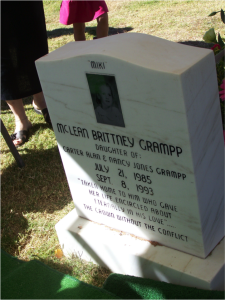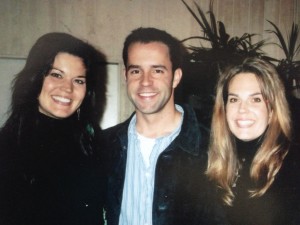I’m an expert on siblings and grief. Not because I’m a psychologist who specializes in grief. No. I am an expert because I have lost two of my sisters.
As I write, it is September 8, 2013—20 years to the day that my youngest sister, McLean, or Miki as we called her, died. She died of cancer of the kidneys. She was eight years old. I was eighteen. We buried Miki on September 11, 1993, my mom’s birthday—a date that would forever be marked for my family, a date that would become marked for the United States, and the world, just eight years later.
On October 17, 2007, my closest sister, Shannon, died. Just 16 months apart, we’d grown up together; we knew each other intimately, we were best friends. (You can read a little about both my sisters’ deaths, here, in chapter 3 of my new memoir).
Siblings & Grief
Losing Shannon was even harder for me than losing Miki, and not just because we were closer. For one, I was older when she died–I understood loss better–but even more, because her husband had died just two months prior and she left behind two young sons. My husband and I would raise her sons as our own.
Tragic as it was–hard as it was to suddenly inherit two sons, and as much as I missed her–I still felt sorrier for my parents, for her children, for her close friends, for everyone but me. I’m just the sibling, I thought. How wrong I was. How wrong so many of us are about siblings and grief.
These two experiences have given me unique insight into sibling grief. I’ve experienced how the death of two different siblings, at two different times of my life, and in two unique sets of circumstances has impacted my family and me. These two death experiences were completely different. My understanding and the impact these deaths, based on my age when they died, was completely different. But, both of my sisters’ deaths had a profound impact on my life.
10 Things Everyone Should Know About Siblings & Grief
There are many things people need to learn about siblings and grief. Here are ten I would like everyone to know.
1) Sibling grief is often misunderstood—by parents, families, friends, and counselors, even by the siblings themselves. So much focus is given to the parents of the lost child, to the children of the lost parent, to the spouse of the lost adult sibling. And, rightly so. But, what about the siblings? What about the ones who, like me, have grown up with the deceased? Who believed they would have a lifetime with their sister or brother? Who now face that lifetime alone?
2) Sibling grief “has been almost entirely overlooked in the literature on bereavement.”[1] It’s no wonder, therefore, that even mental health providers misunderstand sibling grief. How are families supposed to know how to help siblings through grief if even the research on the subject is lacking?
3) Common emotions siblings may feel when a brother or sister dies include:
- Guilt
- Abandonment
- Loss of Innocence
- Fallout from the Family
- Somatic Symptoms
- Fears and Anxiety
4) Siblings may feel “trumped” by the grief of other family members. I sure felt this way, and it’s common, since the focus is usually on the parents if a young sibling dies and on the surviving spouse or children if an older sibling dies. This may lead to minimizing a sibling’s own loss.
5) Young siblings lose innocence when a brother or sister dies, which may lead to fears and anxiety; “Survivor guilt” is also common. Experiencing death as a child becomes a lifelong experience of processing and understanding the loss. Children grow up with grief, understanding more as they get older. Fear of death or dying is common. Anxiety or worry about getting sick may become prevalent. In young siblings, guilt for provocative behavior or for unacceptable feelings (jealousy) is common. Young children may think, before the death, “I wish my brother were dead!” then believe they somehow caused it to happen. Older siblings may wonder, “Why them and not me?” Because siblings are usually similar in age, it can bring up many questions about the sibling’s own life and death, and guilt along with it.
6) Surviving children do, unfortunately, end up taking the fallout from parents’, siblings’, or other family members’ mistakes, emotional blowups, or neglect. In many ways, siblings often experience a double loss: the loss of their sister or brother, and the loss of their parents (at least for a time, but sometimes, permanently). I know this from experience. Though my parents did the best they could, after my youngest sister died, our entire family was different. My mom retreated into her own grief, staying in her room, depressed and sick for years. My dad retreated into work and anything to take his mind from his pain. Luckily, I was already on my own, in college, at the time; my younger siblings weren’t so lucky. At 9, 11, 14, and 17 years old, they grew up with a completely different set of parents than I had. I tried to step in as a “parent” figure over the years, but the separation from my parents in their time of need profoundly influenced their lives. It profoundly influenced my life. It profoundly changed our family.
7) Siblings may manifest somatic symptoms of grief, including symptoms that mimic the deceased sibling’s symptoms. Especially in young children, symptoms like stomachaches, headaches, nightmares, body pain, digestive symptoms, and trouble sleeping are common. These should be seen as symptoms of grief, and hopefully, an adult in the family can help siblings work through their feelings and show them how to grieve.
8) Having someone explain the loss to younger siblings, to be there for them and help them grieve, is ideal. Little children don’t comprehend death in the same way adults do. It is therefore important to have somebody who can walk them through the loss and the grief process, to explain it wasn’t their fault, to validate what they feel. If parents aren’t able to do so, another family member or friend may, and hopefully will, step in.
9) Even adult siblings will feel the loss deeply. The pain isn’t less simply because you’re older. In fact, in many ways, it’s harder. You understand more. You know what it means to die, and you will feel the pain of the loss in a different way than young children, who still haven’t developed abstract thinking and understanding, will. Grieve your loss. If you’re not sure how, here are some ideas.
10) My best advice for siblings in grief: Feel the loss as long as you need to, and give yourself time to heal. Because sibling loss is so misunderstood, you may receive messages that make you feel like you should be “over it by now.” They don’t know sibling loss. Now, you do. It takes time. Lots of time. It’s not about “getting over” the loss of a sibling. You don’t get over it. You create your life and move on, when you’re ready. But you will always remember your brother or sister—the missing piece of your life.
I once heard someone say, “When a parent dies, you lose the past. When a child dies, you lose the future. When a sibling dies, you lose the past and the future.” That is the grief of a sibling—grief for what was past, and grief for what should have been the future. Just remember these things, my friends. Remember to be there for siblings in grief. You can be the difference in helping them create a bright future, even if they now must do so without their beloved sibling.
Related Articles/ Posts
In Memory of My Sister, on the 5th Anniversary of Her Death
“This is How We Grow” Blog Hop: 10 Ways I Choose to Grow Each Day
Children & Grief: What You Should Know
Children & Grief: What You Can Do
“How Do I Grieve?”: Grief Work & TEARS
Understanding & Coping with Loss & Trauma
The Do’s & Don’ts of Helping Others Through Grief
Weather the Storms Together: 4 Ways to Strengthen Families in Times of Stress
50 Ways to Love Your Loved Ones
Parenting Success: It’s More About the Parent than the Child
Hearts Breaking in a Broken World: 7 Ways to Heal From Tragedy Together
FEEL: How to Cope with Powerful Emotions
How to Get Your Needs Met: 4 Tips on Asking & Receiving
In Praise of Fathers: 10 Ways Dads Impact Kids for the Better
Mommy Fails & Mother’s Day: 3 Messages Every Mom Needs to Hear
[1] Becvar, D.S. (2001). In the Presence of Grief: Helping family members resolve death, dying, and bereavement issues. New York, NY; Guilford Press: p.130.


